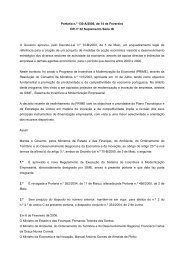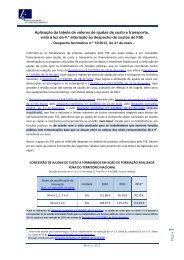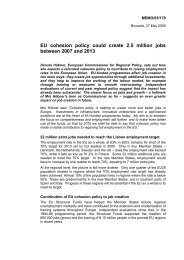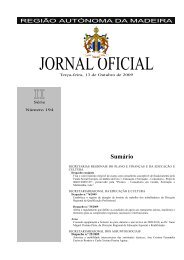Industrial Relations in Europe 2012 - European Commission - Europa
Industrial Relations in Europe 2012 - European Commission - Europa
Industrial Relations in Europe 2012 - European Commission - Europa
Create successful ePaper yourself
Turn your PDF publications into a flip-book with our unique Google optimized e-Paper software.
This immediate and urgent pressure to make sav<strong>in</strong>gs and reduce public expenditure tends to<br />
favour quantitative adjustments, ma<strong>in</strong>ly cuts <strong>in</strong> expenditure, but also jobs and wages <strong>in</strong> the<br />
public sector, which are summarised below. Wage cuts have been implemented <strong>in</strong> various<br />
ways, either through a basic wage freeze or cut <strong>in</strong>, for example, Estonia, Ireland, Latvia,<br />
Lithuania, Romania, or through the abolition of bonuses previously enjoyed by public sector<br />
employees, such as the thirteenth month payment <strong>in</strong> Hungary and the thirteenth and<br />
fourteenth month payments <strong>in</strong> Greece. For details, see table 4.7<br />
Table 4.7: Employment and wage cuts <strong>in</strong> the public sector <strong>in</strong> selected <strong>Europe</strong>an<br />
countries<br />
Employment reductions Wage cuts and structural changes<br />
Croatia New recruitment frozen –6% <strong>in</strong> 2009; return to 2008 level; then freeze<br />
–15% for state officials<br />
Estonia –1% <strong>in</strong> 2008–09 Cuts concerned 71% of public sector employees<br />
–10% <strong>in</strong> public adm<strong>in</strong>istration and –3% <strong>in</strong> education <strong>in</strong> 2009–2010<br />
France –7% <strong>in</strong> 2008–12<br />
Staff reductions <strong>in</strong> hospitals<br />
10% loss <strong>in</strong> real wages due to freeze of <strong>in</strong>dex po<strong>in</strong>ts s<strong>in</strong>ce 2010<br />
Increase <strong>in</strong> the social contribution pension equal to a 3.5% loss <strong>in</strong> net<br />
wages<br />
Wage <strong>in</strong>dividualisation<br />
Germany<br />
Performance-related pay up to 8% of total wage bill<br />
Increase <strong>in</strong> low paid<br />
New lower pay scale to avoid outsourc<strong>in</strong>g<br />
Christmas bonus reduced; reduction of yearly bonus<br />
Greece First target of –20% by 2015<br />
modified to –26%, ma<strong>in</strong>ly through<br />
cuts <strong>in</strong> fixed-term contracts<br />
Already –15% by 2011<br />
Hungary<br />
Downward trend until 2008, then<br />
<strong>in</strong>crease by 4.7% <strong>in</strong> 2008–2010;<br />
and slight decrease by –1.7% <strong>in</strong><br />
2010–2011<br />
Ireland No layoffs so far but no<br />
replacement of retirees and no<br />
renewal of many temporary<br />
contracts<br />
–5.2% <strong>in</strong> 2009–2011<br />
–15–20% <strong>in</strong> 2011 (–21% for military personnel)<br />
Abolition of thirteenth (paid <strong>in</strong> December) and fourteenth month<br />
(Easter and summer) payments<br />
New cuts announced for <strong>2012</strong> (–15%)<br />
11% public sector premium has fallen s<strong>in</strong>ce 2010 and may have<br />
disappeared by end <strong>2012</strong><br />
Abolition of thirteenth month payment <strong>in</strong> 2009 and of subsidies for<br />
hous<strong>in</strong>g, heat<strong>in</strong>g and travel<br />
Cuts between –37% for unskilled and –13% for high skilled <strong>in</strong> 2008–<br />
2010<br />
Public sector premium fell from 15% <strong>in</strong> 2004 to –12% <strong>in</strong> 2009<br />
Wage cuts <strong>in</strong>troduced <strong>in</strong> December 2009 from –5% (for lowest<br />
wage) to –15% (for highest wages)<br />
–4.7% on average <strong>in</strong> 2010<br />
Latvia –4.3% <strong>in</strong> 2008–2009 –25% <strong>in</strong> public adm<strong>in</strong>istration and –20% <strong>in</strong> education <strong>in</strong> 2009–2010<br />
Public sector premium fallen from +21% <strong>in</strong> 2006 to +9% <strong>in</strong> 2010<br />
Lithuania –1.1% <strong>in</strong> 2008–2009 –15% <strong>in</strong> public adm<strong>in</strong>istration <strong>in</strong> 2009–2010<br />
Netherlands Cont<strong>in</strong>ued to <strong>in</strong>crease <strong>in</strong> 2008–<br />
2010 (by 6%) especially part-time.<br />
Significant cuts planned up to<br />
2014<br />
Portugal<br />
–9.5% <strong>in</strong> public adm<strong>in</strong>istration <strong>in</strong><br />
2005–2010<br />
Public sector unemployment<br />
growth of 20%<br />
Romania –9.5% <strong>in</strong> 2008–2011<br />
Further cuts <strong>in</strong> <strong>2012</strong><br />
Wage cuts progressive <strong>in</strong> the 1980s<br />
Real wage decl<strong>in</strong>e <strong>in</strong> 2010–2011 by –1 to 2% (by –2% <strong>in</strong> public<br />
adm<strong>in</strong>istration to –2.5% <strong>in</strong> education);<br />
–2.5% of real wage <strong>in</strong> public adm<strong>in</strong>istration <strong>in</strong> 2010<br />
Further cut of 3.5% to 10% <strong>in</strong> 2011<br />
In <strong>2012</strong> suspension of thirteenth and fourteenth month payments (for<br />
holiday and Christmas bonuses) for medium and high wage earners;<br />
corresponds to –16% for most skilled<br />
In 2000–2009 real wage fall by –3.6% <strong>in</strong> public sector compared to<br />
+9.4% <strong>in</strong> private sector<br />
–25% <strong>in</strong> 2010<br />
Cut of thirteenth month payment and abolition of most bonuses<br />
–10% <strong>in</strong> 2011 despite some attempts to compensate for former cuts<br />
Freeze of wages <strong>in</strong> <strong>2012</strong><br />
188

















